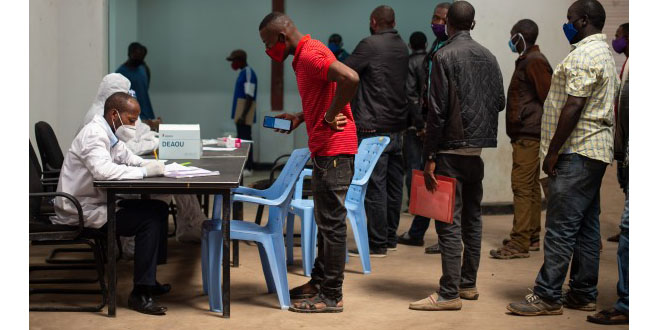

Some of the ToT participants told a delegation of German officials at Namanga border between Kenya and Tanzania last week that the training was of importance. “We benefitted and did a lot of capacity building. In addition to passing the knowledge to colleagues, we also trained other people,” said a laboratory expert at Namanga, Frank Okwema.
Okwema said as a result, they have also organized meetings with sub-county teams and village health teams to train them on the subject. “Normally we handle travellers and receive cash for visas which exposes us to COVID-19. We were trained for instance on social distancing, contamination and disposal of contaminated items,” he said.
Okwema’s observation was backed by an Immigration Officer at the same border, Peter Ndichu who noted that because border posts are high-risk areas in the spreading of COVID-19 and other infectious diseases, the training was crucial as it involved two countries.
“So we use the knowledge from the training to guide colleagues and travellers on how they can protect themselves and protect others,” Ndichu said adding that things have improved for the better in the handling of people and goods crossing the Tanzania and Kenya common border.
The East African Community secretariat with support from the German government through the Deutsche Gesellschaft für Internationale Zusammenarbeit (GIZ) GmbH engaged AMREF Flying Doctors to conduct the emergency intervention trainings.
A total of 375 staff were involved of which 327 were certified, at 12 One Stop Border Posts and four harbours in the region, covering all six partner states.
The visiting German delegation included: Claudia Imwolde-Kraemer from the German Ministry for Economic Cooperation and Development; Jennifer Wörl and Dr Ralf Orlik from German Development Bank (KfW); and Johannes Sperrfechter from the German Embassy in Tanzania.
The training also involved staff from port and animal health, customs, immigration, revenue officers, luggage handlers, clearing agents, standards officers, border security and the joint cross-border management committees. “The training was very good and well organized. It is perhaps a wake-up call that we need to include some of the modules in the training curriculum of for example immigration officers,” Ndichu added.
The delegation visited the mobile laboratory, which is an initiative of the EAC secretariat and is being funded by Germany through the KfW and the Bernhard Nocht Institute for Tropical Medicine. One of two mobile laboratories was handed over to the Kenyan National Public Health Lab in May 2020.
The lab has since been operating at the border between Tanzania and Kenya, mainly for COVID-19 testing of truck drivers, to facilitate continued cross-border trade. As of October 2021, the lab had processed over 70,000 COVID-19 tests, including samples of more than 60,000 truck drivers, over 2,000 health care workers, and additional travellers and patients.
Article first published on https://www.ippmedia.com/en/business/covid-19-training-beneficial-infection-prevention-namanga-border
Achuman Emoni stretches her hands, illustrating the vast distance she has travelled to reach the…
During a session held at Africa Health Agenda International Conference in Kigali, Rwanda, on 4th…
Amref Health Africa, in collaboration with the Turkana County Department of Health Services, introduced the…
Amref Health Africa, in collaboration with the Turkana County Department of Health Services, introduced the…
Over the past six years, Amref Health Africa has positioned itself as a leading voice…
Africa has made significant strides in advocating for health research and development, yet gaps in…